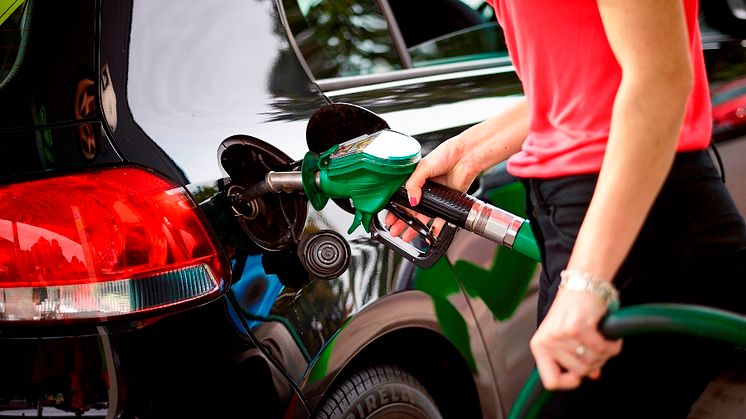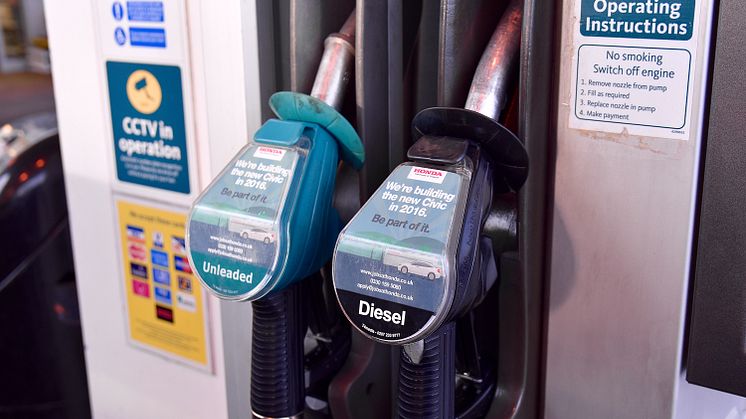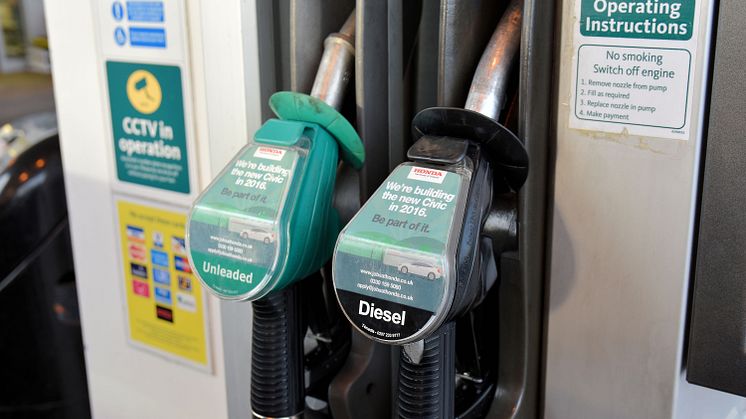
Press release -
Price of petrol increases for second month in a row adding £1.45 to a fill-up
RAC Fuel Watch data for April shows motorists have suffered the second consecutive month of price rises at the pumps as a result of a 25% increase in the cost of a barrel of oil from $36.51 to $45.49 (1 & 29 April), leading to the highest price since 10 November 2015 – $45.62 on 28 April.
The escalating oil price is the primary reason behind the forecourt increases with the average price of both petrol and diesel going up by more than 2p a litre to 108.27p (from 105.64p) and 108p (from 105.41p) respectively. The wholesale cost of petrol rose 2.5p whereas diesel increased by 4.6p a litre.
The petrol price rise has added another £1.45 to the cost of filling up a 55-litre family car (£58.10 to £59.55) on top of the £1.84 increased cost seen in March, making for a combined increase of £3.29p since 1 March. The cost of a tank of diesel rose by a similar amount in April – £1.42 (£57.98 to £59.40) on top of the £2 increase seen in March – making a two-month jump of £3.42 for a fill-up.
Supermarket average prices rose by 3p a litre for both fuels with petrol rising from 102.68p per litre to 105.85p and diesel from 102.58p to 105.76p.
RAC fuel spokesman Simon Williams said: "The physical or spot price of Brent crude oil saw its largest one-month gain in price in the past 12 months. While this has had an adverse impact on the price motorists are paying for petrol and diesel on the forecourt, the world is still producing too much oil which means prices should not rise much further, and may stabilise or even start to fall again.
“It’s worth remembering that while prices have gone up in both March and April motorists are still paying 7p per litre less for petrol and 11p per litre less for diesel than they were at this time a year ago which means a tank of unleaded is more than £3 cheaper and diesel is £6 less expensive.
“The world oil market is currently in a very unusual situation. For some time OPEC – the Organisation of the Petroleum Exporting Countries – has been operating an overproduction strategy to keep prices low to stop the US producing oil from fracking, but April saw reduced production from Iraq and Nigeria due to supply disruptions and from the United Arab Emirates due to maintenance, which alongside a US fall in production, appears to have led to the oil price going up.
“But, if the barrel price reaches $50 drilling would become a profitable option again for US shale producers and OPEC’s long-term efforts to maintain its market share would be undermined. For this reason it seems unlikely that the oil price will increase too much more.”
UK fuel price variation
Across the UK, the South East saw the biggest increases with more than 3p a litre going on both the average prices of petrol and diesel – unleaded went from 105.48p to 108.89p and diesel from 105.52p to 108.9p. The East Midlands recorded the lowest petrol price rise of 2.77p a litre from 105.4p to 108.17p whereas the price of diesel in Northern Ireland was the lowest, only rising by 2.63p a litre from 104.02p to 106.65p.
| Petrol - ppl | Start of April | End of April | Change | |
| 1 | South East | 105.48 | 108.89 | +3.41 |
| 2 | South West | 105.27 | 108.49 | +3.22 |
| 2 | West Midlands | 105.51 | 108.73 | +3.22 |
| 4 | Northern Ireland | 103.97 | 107.17 | +3.20 |
| 5 | Scotland | 105.13 | 108.24 | +3.11 |
| 6 | North | 105.05 | 108.15 | +3.10 |
| 7 | North West | 105.28 | 108.37 | +3.09 |
| 8 | East Anglia | 105.21 | 108.29 | +3.08 |
| 9 | Yorkshire And Humber | 104.78 | 107.81 | +3.03 |
| 10 | Wales | 105.10 | 108.08 | +2.98 |
| 11 | East Midlands | 105.40 | 108.17 | +2.77 |
| Diesel - ppl | Start of April | End of April | Change | |
| 1 | South East | 105.52 | 108.90 | +3.38 |
| 2 | West Midlands | 105.33 | 108.41 | +3.08 |
| 3 | North | 104.97 | 108.04 | +3.07 |
| 4 | East Anglia | 105.37 | 108.43 | +3.06 |
| 5 | Scotland | 105.19 | 108.24 | +3.05 |
| 6 | North West | 105.29 | 108.33 | +3.04 |
| 7 | Yorkshire And Humber | 104.79 | 107.83 | +3.04 |
| 8 | South West | 105.47 | 108.44 | +2.97 |
| 9 | East Midlands | 105.37 | 108.28 | +2.91 |
| 10 | Wales | 105.08 | 107.90 | +2.82 |
| 11 | Northern Ireland | 104.02 | 106.65 | +2.63 |
* Regional prices based on 31 March to 2 May 2016. UK average prices on 31 March – petrol 105.26p; diesel 105.26p. 2 May – petrol 108.46p; diesel 108.35p.
Motorists can keep abreast of the latest fuel prices by visiting: rac.co.uk/fuelwatch or following #racfuelwatch on Twitter.
Topics
Categories
Notes to Editors
* The core data for the April RAC Fuel Watch report is based on an analysis of Experian Catalist average prices from 1-28 April.
About the RAC
With more than eight million members, the RAC is one of the UK's most progressive motoring organisations, providing services for both private and business motorists. Whether it's roadside assistance, insurance, buying a used car, vehicle inspections and checks, legal services or up-to-the-minute traffic and travel information – the RAC offers a solution for all motoring needs. The RAC is committed to making motoring easier, safer, more affordable and more enjoyable for drivers and road users.
The RAC is the motorist’s champion and campaigns to support the interests of its members and UK motorists at a national level, including advancing levels of road safety, supporting the needs of young drivers and voicing concerns about the increasing cost of motoring. The RAC’s annual Report on Motoring – first published in 1989 – provides a clear insight into the concerns and issues facing today’s motorists.
For the very latest news on UK fuel prices, check RAC Fuel Watch or follow #racfuelwatch on Twitter. This is a comprehensive guide to the latest UK unleaded petrol and diesel prices – both at the wholesale level and at the pump. RAC Fuel Watch analyses how prices changed through the previous month and compares the most recent prices with those from three, six and 12 months before.
Key facts:
- RAC patrols fix four out of five vehicles at the roadside and on average within 30 minutes
- RAC vans carry more than 500 parts and tools to get members’ vehicles going again
- 92% of members would recommend RAC Rescue to their friends and family



